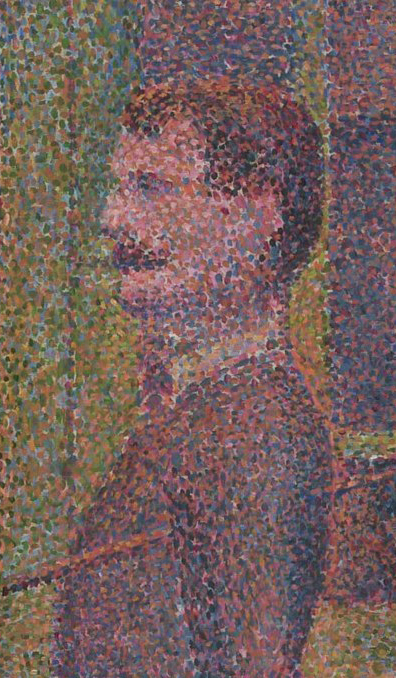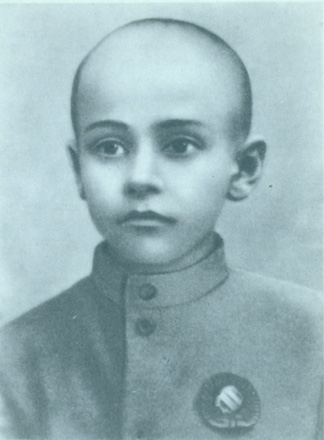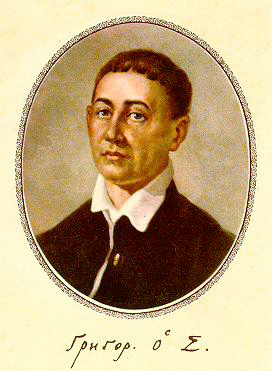|
Ivan Karabyts
Ivan Fedorovych Karabyts ( uk, Іван Федорович Карабиць; January 17, 1945 – January 20, 2002) was a Ukrainian composer and conductor, and a People's Artist of Ukraine. He was born in village Yalta in the Donetsk region of the Ukraine, and graduated from the Kyiv Conservatory in 1971, where he studied under Borys Lyatoshynsky and Myroslav Skoryk. Karabyts conducted the Dance Ensemble of the Kyiv Military District and the Kyiv Camerata. He also taught at the Kyiv Conservatory. Ivan Karabyts wrote works for solo piano, orchestra, voice, piano, and voice, as well as different combinations of instruments. His works have been performed throughout the nations of the former Soviet Union, many European nations, and the United States. He died in Kyiv, aged 57. His son is the conductor Kirill Karabits. Style L. Kyyanovska maintained that all of the composers who influenced Karabyts' music were united by passion and a willingness to confront the officially accept ... [...More Info...] [...Related Items...] OR: [Wikipedia] [Google] [Baidu] |
Ukrainians
Ukrainians ( uk, Українці, Ukraintsi, ) are an East Slavs, East Slavic ethnic group native to Ukraine. They are the seventh-largest nation in Europe. The native language of the Ukrainians is Ukrainian language, Ukrainian. The majority of Ukrainians are Eastern Orthodox Church, Eastern Orthodox Christians. While under the Polish–Lithuanian Commonwealth, the Austrian Empire, and then Austria-Hungary, the East Slavic population who lived in the territories of modern-day Ukraine were historically known as Ruthenians, referring to the territory of Ruthenia, and to distinguish them with the Ukrainians living under the Russian Empire, who were known as Little Russians, named after the territory of Little Russia. Cossacks#Ukrainian Cossacks, Cossack heritage is especially emphasized, for example in the Shche ne vmerla Ukraina, Ukrainian national anthem. Ethnonym The ethnonym ''Ukrainians'' came into wide use only in the 20th century after the territory of Ukraine obtained ... [...More Info...] [...Related Items...] OR: [Wikipedia] [Google] [Baidu] |
Pointillism
Pointillism (, ) is a technique of painting in which small, distinct dots of color are applied in patterns to form an image. Georges Seurat and Paul Signac developed the technique in 1886, branching from Impressionism. The term "Pointillism" was coined by art critics in the late 1880s to ridicule the works of these artists, but is now used without its earlier pejorative connotation. The movement Seurat began with this technique is known as Neo-impressionism. The Divisionism, Divisionists used a similar technique of patterns to form images, though with larger cube-like brushstrokes. Technique The technique relies on the ability of the eye and mind of the viewer to blend the color spots into a fuller range of tones. It is related to Divisionism, a more technical variant of the method. Divisionism is concerned with color theory, whereas pointillism is more focused on the specific style of brushwork used to apply the paint. It is a technique with few serious practitioners today an ... [...More Info...] [...Related Items...] OR: [Wikipedia] [Google] [Baidu] |
Academic Staff Of Kyiv Conservatory
An academy (Attic Greek: Ἀκαδήμεια; Koine Greek Ἀκαδημία) is an institution of secondary education, secondary or tertiary education, tertiary higher education, higher learning (and generally also research or honorary membership). The name traces back to Plato's school of philosophy, founded approximately 385 BC at Akademia, a sanctuary of Athena, the goddess of wisdom and Skills, skill, north of Ancient Athens, Athens, Greece. Etymology The word comes from the ''Academy'' in ancient Greece, which derives from the Athenian hero, ''Akademos''. Outside the city walls of Athens, the Gymnasium (ancient Greece), gymnasium was made famous by Plato as a center of learning. The sacred space, dedicated to the goddess of wisdom, Athena, had formerly been an olive Grove (nature), grove, hence the expression "the groves of Academe". In these gardens, the philosopher Plato conversed with followers. Plato developed his sessions into a method of teaching philosophy and in 3 ... [...More Info...] [...Related Items...] OR: [Wikipedia] [Google] [Baidu] |
Kyiv Conservatory Alumni
Kyiv, also spelled Kiev, is the capital and most populous city of Ukraine. It is in north-central Ukraine along the Dnieper River. As of 1 January 2021, its population was 2,962,180, making Kyiv the seventh-most populous city in Europe. Kyiv is an important industrial, scientific, educational, and cultural center in Eastern Europe. It is home to many high-tech industries, higher education institutions, and historical landmarks. The city has an extensive system of public transport and infrastructure, including the Kyiv Metro. The city's name is said to derive from the name of Kyi, one of its four legendary founders. During its history, Kyiv, one of the oldest cities in Eastern Europe, passed through several stages of prominence and obscurity. The city probably existed as a commercial center as early as the 5th century. A Slavic settlement on the great trade route between Scandinavia and Constantinople, Kyiv was a tributary of the Khazars, until its capture by the Varangians ... [...More Info...] [...Related Items...] OR: [Wikipedia] [Google] [Baidu] |
Mezzo-soprano
A mezzo-soprano or mezzo (; ; meaning "half soprano") is a type of classical female singing voice whose vocal range lies between the soprano and the contralto voice types. The mezzo-soprano's vocal range usually extends from the A below middle C to the A two octaves above (i.e. A3–A5 in scientific pitch notation, where middle C = C4; 220–880 Hz). In the lower and upper extremes, some mezzo-sopranos may extend down to the F below middle C (F3, 175 Hz) and as high as "high C" (C6, 1047 Hz). The mezzo-soprano voice type is generally divided into the coloratura, lyric, and dramatic mezzo-soprano. History While mezzo-sopranos typically sing secondary roles in operas, notable exceptions include the title role in Bizet's '' Carmen'', Angelina (Cinderella) in Rossini's ''La Cenerentola'', and Rosina in Rossini's ''Barber of Seville'' (all of which are also sung by sopranos and contraltos). Many 19th-century French-language operas give the leading female role to mezzos, includin ... [...More Info...] [...Related Items...] OR: [Wikipedia] [Google] [Baidu] |
Soprano
A soprano () is a type of classical female singing voice and has the highest vocal range of all voice types. The soprano's vocal range (using scientific pitch notation) is from approximately middle C (C4) = 261 Hz to "high A" (A5) = 880 Hz in choral music, or to "soprano C" (C6, two octaves above middle C) = 1046 Hz or higher in operatic music. In four-part chorale style harmony, the soprano takes the highest part, which often encompasses the melody. The soprano voice type is generally divided into the coloratura, soubrette, lyric, spinto, and dramatic soprano. Etymology The word "soprano" comes from the Italian word '' sopra'' (above, over, on top of),"Soprano" '' |
Pavlo Tychyna
Pavlo Hryhorovych Tychyna ( uk, Павло Григорович Тичина; – September 16, 1967) was a major Ukrainian poet, translator, publicist, public activist, academician, and statesman. He composed the lyrics to the Anthem of the Ukrainian Soviet Socialist Republic. Life Born in Pisky in 1891, he was baptized on January 27, which was mistakenly considered his birth date until recently. His father, Hryhoriy Timofiyovych Tychynin, was a village deacon and a teacher in the local grammar school. His mother, Maria Vasylivna Tychynina (Savytska), was eleven years younger than Pavlo's father. Pavlo had nine siblings: five sisters and four brothers. At first young Tychyna studied at the district's elementary school which was opened in Pisky in 1897. His first teacher was Serafima Morachevska who later recommended him to try his talent in chorus. In 1900 he became a member of an archiary chorus in the Trinity (Troitsky) monastery near Chernihiv. Simultaneously young Tychyna ... [...More Info...] [...Related Items...] OR: [Wikipedia] [Google] [Baidu] |
Mykola Rudenko
Mykola Danylovych Rudenko ( uk, Мико́ла Дани́лович Руде́нко; 19 December 1920, Yurivka, Luhansk Oblast, Yurivka, Donets Governorate, Ukrainian Soviet Socialist Republic, Ukrainian SSR – 1 April 2004, Kyiv) was a Ukrainians, Ukrainian poet, writer, philosopher, Soviet dissidents, Soviet dissident, human rights Activism, activist and World War II veteran. He was the founder of the Ukrainian Helsinki Group, and was twice arrested for his dissident activities. Biography Rudenko was seven years old when his father died in a mining accident. With his mother and two siblings, he worked on the family farm until they were forced to give their land during the process of collectivization. He was traumatized by the Holodomor, and remarked that it remained with him his entire life. He began to write as a child, and had some of his poems published by the local newspapers. His writing earned him a scholarship to Taras Shevchenko National University of Kyiv, Ky ... [...More Info...] [...Related Items...] OR: [Wikipedia] [Google] [Baidu] |
Catherine Motrych
Katherine, also spelled Catherine, and other variations are feminine names. They are popular in Christian countries because of their derivation from the name of one of the first Christian saints, Catherine of Alexandria. In the early Christian era it came to be associated with the Greek adjective (), meaning "pure", leading to the alternative spellings ''Katharine'' and ''Katherine''. The former spelling, with a middle ''a'', was more common in the past and is currently more popular in the United States than in Britain. ''Katherine'', with a middle ''e'', was first recorded in England in 1196 after being brought back from the Crusades. Popularity and variations English In Britain and the U.S., ''Catherine'' and its variants have been among the 100 most popular names since 1880. The most common variants are ''Katherine,'' ''Kathryn,'' and ''Katharine''. The spelling ''Catherine'' is common in both English and French. Less-common variants in English include ''Katheryn'', ... [...More Info...] [...Related Items...] OR: [Wikipedia] [Google] [Baidu] |
Borys Oliynyk (poet)
Borys Illich Oliynyk ( uk, Борис Ілліч Олійник; russian: Борис Ильич Олейник, Boris Ilich Oleynik; 22 October 1935 – 30 April 2017) was a Ukrainian poet, translator, and political activist. He served in the Verkhovna Rada from 1992 to 2006 and was chairman of the Ukrainian Culture Fund. Before his death, Oliynyk was the most prominent representative of the national-communist movement within the Communist Party of Ukraine. In 2005, he was awarded the title "Hero of Ukraine Hero of Ukraine (HOU; uk, Герой України, ''Heroi Ukrainy'') is the highest national title that can be conferred upon an individual citizen by the President of Ukraine. The title was created in 1998 by President Leonid Kuchma and as ...." While being Ukrainian, Oliynyk also officially adopted a Russian version of his last name as Oleynik. References 1935 births 2017 deaths Burials at Baikove Cemetery People from Poltava Oblast Communist Party of Uk ... [...More Info...] [...Related Items...] OR: [Wikipedia] [Google] [Baidu] |
Ivan Franko
Ivan Yakovych Franko (Ukrainian: Іван Якович Франко, pronounced ˈwɑn ˈjɑkowɪtʃ frɐnˈkɔ 27 August 1856 – 28 May 1916) was a Ukrainian poet, writer, social and literary critic, journalist, interpreter, economist, political activist, doctor of philosophy, ethnographer, and the author of the first detective novels and modern poetry in the Ukrainian language. He was a political radical, and a founder of the socialist and nationalist movement in western Ukraine. In addition to his own literary work, he also translated the works of such renowned figures as William Shakespeare, Lord Byron, Pedro Calderón de la Barca, Dante Alighieri, Victor Hugo, Adam Mickiewicz, Johann Wolfgang von Goethe and Friedrich Schiller into Ukrainian. His translations appeared on the stage of the Ruska Besida Theatre. Along with Taras Shevchenko, he has had a tremendous impact on modern literary and political thought in Ukraine. Life Franko was born in the Ukrainian village ... [...More Info...] [...Related Items...] OR: [Wikipedia] [Google] [Baidu] |
Hryhoriy Skovoroda
Hryhorii Skovoroda, also Gregory Skovoroda or Grigory Skovoroda ( la, Gregorius Scovoroda; uk, Григорій Савич Сковорода, ''Hryhorii Savych Skovoroda''; russian: Григо́рий Са́ввич Сковорода́, ''Grigory Savvich Skovoroda''; 3 December 1722 – 9 November 1794) was a philosopher of Ukrainian Cossack origin who lived and worked in the Russian Empire. He was a poet, a teacher and a composer of liturgical music. His significant influence on his contemporaries and succeeding generations and his way of life were universally regarded as Socratic, and he was often called a "Socrates". Skovoroda's work contributed to the cultural heritage both of modern-day Ukraine and of Russia. Skovoroda wrote his texts in a mixture of three languages: Church Slavic, Ukrainian, and Russian, with a large number of Western-Europeanisms, and quotations in Latin and Greek. Most of his surviving letters were written in Latin or Greek, but a small frac ... [...More Info...] [...Related Items...] OR: [Wikipedia] [Google] [Baidu] |


.jpg)


